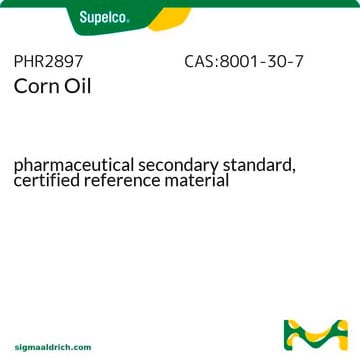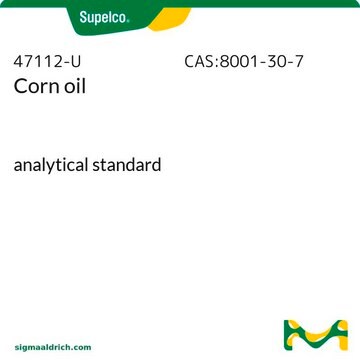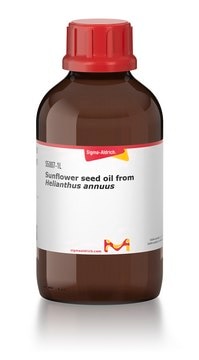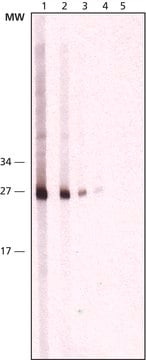C8267
Corn oil
delivery vehicle for fat-soluble compounds
Synonym(s):
Maize oil
Sign Into View Organizational & Contract Pricing
All Photos(1)
About This Item
Recommended Products
biological source
maize
Quality Level
form
liquid
color
very faintly yellow to yellow
density
0.9 g/mL at 25 °C (lit.)
application(s)
life science and biopharma
sample preparation
functional group
ester
lipid type
oils
shipped in
ambient
storage temp.
room temp
Looking for similar products? Visit Product Comparison Guide
General description
Corn oil, a highly unsaturated vegetable oil extracted from the germ of corn, is a versatile chemical compound extensively used in biochemical research. It can be used as a carrier/delivery vehicle for fat-soluble compounds, including toxins, and as a glidant in excipient research. Corn oil contains high levels of polyunsaturated fats, including omega-6 and omega-3 fatty acids in a ratio of 2:1. Additionally, when combined with surfactants and gel-forming polymers, it is used in formulation research for developing veterinary vaccines.
Application
Corn oil has been used in research applications as delivery vehicle for fat-soluble compounds including toxins. It is also used in the delivery of tamoxifen (TAM) in mice, curcumin in rats and [3H]retinol in mice.
corn oil has been used in research applications as delivery vehicle for fat-soluble compounds including toxins.
Features and Benefits
- Can be used in Metabolomics, Biochemical and Formulation research
- High-quality compound suitable for multiple research applications
Other Notes
For additional information on our range of Biochemicals, please complete this form.
Storage Class Code
10 - Combustible liquids
WGK
awg
Flash Point(F)
489.2 °F - open cup
Flash Point(C)
254 °C - open cup
Personal Protective Equipment
dust mask type N95 (US), Eyeshields, Gloves
Certificates of Analysis (COA)
Search for Certificates of Analysis (COA) by entering the products Lot/Batch Number. Lot and Batch Numbers can be found on a product’s label following the words ‘Lot’ or ‘Batch’.
Already Own This Product?
Find documentation for the products that you have recently purchased in the Document Library.
Customers Also Viewed
Protective effects of curcumin supplementation on intestinal ischemia reperfusion injury
Okudan N, et al.
Phytomedicine, 20(10), 844-848 (2013)
Content of fatty acids in corn (Zea mays L.) oil from Ecuador
Carrillo W, et al.
Prostaglandins, Leukotrienes, and Essential Fatty Acids, 10, 150-153 (2017)
Effects of Repeated Intraperitoneal Injection of Pharmaceutical-grade and Nonpharmaceutical-grade Corn Oil in Female C57BL/6J Mice
Hubbard JS, et al.
Journal of the American Association For Laboratory Animal Science, 56(6), 779-785 (2017)
Shery Park et al.
Stem cells and development, 25(23), 1801-1807 (2016-10-21)
Repair of calvarial bony defects remains challenging for craniofacial surgeons. Injury experiments on animal calvarial bones are widely used to study healing mechanisms and test tissue engineering approaches. Previously, we identified Gli1+ cells within the calvarial sutures as stem cells
Rodica Petruta Bunaciu et al.
Journal of environmental pathology, toxicology and oncology : official organ of the International Society for Environmental Toxicology and Cancer, 30(4), 273-282 (2011-12-21)
We report the role of dietary glycine and the type of oil used as a vehicle in the hepatotoxicity of control rats and rats treated with 2,2',4,4',5,5'-hexachlorobiphenyl (PCB-153). In our first experiment, glycine or valine (as control) was fed in
Our team of scientists has experience in all areas of research including Life Science, Material Science, Chemical Synthesis, Chromatography, Analytical and many others.
Contact Technical Service









